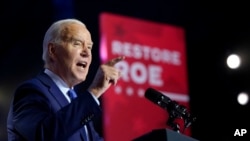The burning conflict in Gaza has lit a spark under untold numbers of American voters, and put extra heat on U.S. President Joe Biden's reelection bid. Protesters have interrupted his recent campaign appearances to express their anger over his support of Israel's military campaign.
On Wednesday, protesters briefly disrupted a labor union event where Biden was speaking. During a Tuesday rally focused on abortion access, 14 protesters shouted through most of Biden's speech in Manassas, Virginia. The interruptions clearly frustrated the president.
"This is going to go on for a while," Biden said. "They have got this planned."
That protest was organized by Die-In For Humanity, a 700-member strong protest group that has made nearly 100 appearances at Biden events, the U.S. Capitol, outside administration members' homes, outside the Israeli Embassy, and at January's protest in Washington.
"I think the majority of people are not OK with American tax dollars being used to commit atrocities overseas," Hazami Barmada, the group's lead organizer, told VOA. She was among the protesters escorted out of Tuesday's event.
"We're seeing a shift in the tide in the United States with complete rejection — in essence — of Biden," said Barmada. "...what we're saying is that you're not going to get the vote of the American community when you constantly continue to disregard the voices of the Arab American community that are saying stop the injustice and the atrocities in Gaza."
The White House said Wednesday the president supports Americans' right to peacefully protest.
"He also believes it's really important that Israel have the right and the ability to continue to defend themselves against — which is ... what is clearly still a viable threat from Hamas," said John Kirby, strategic communications coordinator for the National Security Council.
"But that doesn't mean we're going to stop, again, urging a stronger focus by our Israeli counterparts on minimizing civilian casualties and on getting aid in," Kirby said.
Foreign policy, political analysts say, rarely drives elections but can make a difference when the competition is tight. Like for undecided New Hampshire voter Isaac Geer, who participated Tuesday in a primary vote that Biden and Republican contender Donald Trump won for their respective parties.
"The biggest thing I'm voting for this election season is foreign policy," he told VOA, speaking in Nashua, New Hampshire. "It's really important to me that we stay out of any foreign wars and keep our military spending down, and bring our troops back home or keep them home."
Trump's plan to resolve the Gaza crisis is unclear, and his previous actions as president included a much-criticized "ban" of Muslim immigrants. VOA reached out several times to the Trump campaign, but they did not respond.
For Muslim activists, it's a stark choice. Hassan Abdel Salam is a Minneapolis-based professor who co-founded the Abandon Biden movement of Muslim voters, which focuses on swing states. He is a Canadian citizen.
"Mr. Trump prevented our friends and colleagues and family from entering the country," he told VOA. "But Mr. Biden killed them. And that four years under any Republican is incomparable to one day in Gaza, that an argument has emerged within our communities, that we have to sacrifice."
Political analysts say Biden is in a difficult position.
"There's no doubt that the situation in Gaza is a political problem for Biden," Norm Ornstein, a senior fellow emeritus at the American Enterprise Institute, told VOA. "If you step back and look objectively, Biden has handled this issue adroitly about as well as any president could. He understood early on that by hugging [Israeli Prime Minister Benjamin] Netanyahu close, he could keep some of the worst things from happening in Gaza. But he's now getting very close to pushing Bibi aside. And that means that the initial move — which alienated a lot of voters, not just Arab American voters, but young progressives — may in fact end up being worse for him, because if he pushes or spurns Bibi Netanyahu aside, then some of his strongest supporters, pro-Israel supporters, may be unhappy as well."
Carolyn Presutti contributed to this report from Nashua, New Hampshire. Patsy Widakuswara contributed from Washington.
